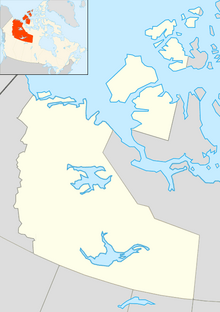Rabbitkettle Hot Springs facts for kids
Quick facts for kids Rabbitkettle Hot Springs |
|
|---|---|
| Name origin | Dene |
| Location | Nahanni National Park Reserve, Northwest Territories |
| Coordinates | 61°56′N 127°10′W / 61.933°N 127.167°W |
| Type | hot spring |
| Temperature | 21 °C (70 °F) |
The Rabbitkettle Hot Springs are amazing natural hot springs in Canada's Northwest Territories. You can find them in the beautiful Nahanni National Park Reserve, right by the South Nahanni River.
These special springs sit on a flat area made of limestone rock. They have two huge mounds made of a rock called travertine. The North Mound stands alone and is about 20 meters (65 feet) tall and 70 meters (230 feet) wide. It's the biggest travertine mound in all of Canada! The South Mound is not as tall because it has grown into a nearby hill. What makes these mounds extra special is that they are the only ones of their kind in the world found on permafrost (ground that stays frozen). The mounds are very colorful and have many layers, like steps.
The name "Rabbitkettle" comes from the Dene people's word gahnhthah, which means "kettle". English-speaking people started calling it "Rabbitkettle" because the pools look like kettles. The Dene people thought these springs were a sacred place. They would leave gifts, like tobacco, to wish for good luck.
How the Hot Springs Formed
The warm water for these springs comes from deep inside the Earth. It flows up through a crack in the limestone rock. It's like a natural plumbing system that pulls hot water from almost 2,000 meters (6,500 feet) below the ground!
The water comes out in a main pool at the very top of the mound. Then, it gently flows down into many smaller pools that are arranged like terraces. The edges of these pools, made of travertine, can be as tall as 30 centimeters (1 foot). They can be gray or off-white.
The spring water is full of minerals from the limestone, especially calcium carbonate. As the water flows, these minerals stick to everything, slowly building up and forming special rock shapes called rimstone dams. Over time, the older pools fill up with these minerals. When they get too full, the water spills over, creating new pools. These amazing mounds started forming about 10,000 years ago, after the last big ice age ended.
Visiting Rabbitkettle Hot Springs
The rock structures at Rabbitkettle Hot Springs are very delicate and can be easily damaged. Because of this, visitors can only see the hot springs with a park guide. When you visit the North Mound, you need to take off your shoes and walk barefoot on a special path. This helps protect the fragile rock formations.


